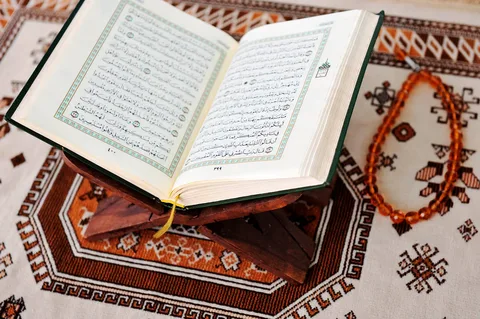The Quran, the holy book of Islam, holds numerous stories and mentions of remarkable women, with Mary (Maryam in Arabic) being one of the most significant. She is revered not only as the mother of Jesus (Isa in Arabic) but also as a paragon of virtue, piety, and strength. in This article on Arabian Tongue we will delves into women in the quran mary, highlighting her unique status and the profound lessons her story offers to believers.
Historical Context of Mary

Mary’s story in the Quran begins with her lineage, rooted in a noble family. She is from the line of Imran, a family blessed with divine favor. This context sets the stage for her remarkable life, underscoring her purity and the high expectations placed upon her even before her birth.
Mary’s Role in Islamic Tradition
In Islamic tradition, Mary holds a unique position. She is not just the mother of a prophet but a symbol of unwavering faith and divine grace. Her story is a testament to her exceptional spiritual stature and her unwavering trust in God’s plan.
Mary in Islamic Scriptures

Mary is mentioned in several chapters of the Quran, most notably in Surah Maryam (Chapter 19) and Surah Al-Imran (Chapter 3). These chapters provide a detailed account of her life, emphasizing her devotion and the miraculous events surrounding her.
Key Verses about Mary
Key verses about Mary include Surah Maryam 19:16-34, which narrates the birth of Jesus, and Surah Al-Imran 3:35-47, which discusses her own birth and the annunciation of Jesus’ conception. These verses highlight her purity, her steadfastness, and her significant role in God’s plan.
The Birth of Mary
The Quran recounts how Mary’s mother, Hannah, prayed earnestly for a child. Her prayers were answered, and she vowed to dedicate her child to God’s service. This moment is a prelude to the divine favor that would follow Mary throughout her life.
Mary’s Birth and Childhood
Mary’s birth was seen as a blessing, and her early life was marked by her mother’s vow. She grew up under the care of her guardian, Zechariah, and displayed exceptional piety from a young age.
Mary’s Upbringing and Spiritual Journey
Mary was dedicated to the temple, where she lived a life of devotion and service. Her upbringing in such a spiritual environment shaped her into a devout and righteous woman, setting her apart even in her youth.
Role of Zechariah in Mary’s Life
Zechariah, a prophet and her guardian, played a crucial role in Mary’s spiritual development. He provided guidance and support, witnessing firsthand her miraculous experiences and unwavering faith.
The Annunciation to Mary
The moment of annunciation is one of the most significant events in Mary’s life. An angel appeared to her, delivering the news that she had been chosen to bear a child, Jesus A Prophet of God, through divine intervention. This announcement was both a test and a testament to her faith.
Mary’s Reaction and Acceptance
Despite the initial shock, Mary accepted the divine decree with grace and submission. Her reaction exemplified her deep faith and trust in God’s wisdom, even when faced with an incomprehensible situation.
The Miraculous Birth of Jesus
Conception of Jesus The conception of Jesus is described as a miraculous event, occurring by the will of God alone. Mary’s purity and the divine nature of this event are emphasized, highlighting the extraordinary circumstances of Jesus’ birth.
The Birth and Mary’s Journey
Mary gave birth to Jesus in a remote location, facing immense challenges alone. Her journey, marked by divine signs and her steadfast faith, culminated in the miraculous birth of one of Islam’s greatest prophets.
Mary’s Virtues and Characteristics
- Piety and Devotion: Mary’s life is a testament to her piety and unwavering devotion to God. Her commitment to her faith, even in the face of immense trials, serves as a powerful example for believers.
- Patience and Strength: Mary’s patience and strength are evident throughout her story. She endured societal judgment and personal hardships with remarkable resilience, embodying the virtues of patience and steadfastness.
Mary as a Role Model
Mary’s story has a profound influence on Muslim women. She is seen as a model of virtue, embodying qualities such as faith, patience, and strength. Her example inspires women to uphold their faith and values in all circumstances.
Mary in Islamic Education
Mary’s life and virtues are often taught in Islamic education, serving as lessons in faith and morality. Her story is used to illustrate the importance of piety, devotion, and trust in God’s plan.
Comparisons with Christian Perspectives
Mary in the Bible vs. the Quran, While Mary is a revered figure in both Christianity and Islam, there are differences in her portrayal. In the Quran, Mary is celebrated primarily for her piety and her role in Jesus’ miraculous birth, while the Bible also emphasizes her motherhood and her presence in Jesus’ ministry.
Both religious texts highlight Mary’s purity and her unique role in divine history. However, the Quran places more emphasis on her as an exemplar of faith and obedience to God, which is central to her significance in Islam.
Mary’s Legacy in the Quran
Mary’s story does not end with the birth of Jesus. Her legacy continues through the Quranic narrative, emphasizing her ongoing role in God’s plan and her enduring impact on believers.
Impact on Islamic Theology
Mary’s story has a lasting impact on Islamic theology, underscoring themes of faith, purity, and divine intervention. Her example continues to inspire theological reflections and spiritual teachings.
Symbolism and Significance of Mary
Mary as a Symbol of Purity, Mary is often regarded as a symbol of purity and divine grace. Her life embodies the ideals of spiritual cleanliness and unwavering faith, making her a revered figure in Islamic tradition.
Mary’s Role in Interfaith Dialogue
Mary serves as a bridge in interfaith dialogue between Muslims and Christians. Her respected position in both religions provides common ground for discussions on faith, virtue, and divine grace.
FAQs
How is Mary referred to in the Quran?
Mary is referred to as Maryam in the Quran.
Is Mary considered a prophet in Islam?
No, Mary is not considered a prophet in Islam, but she is highly revered as the mother of Prophet Jesus (Isa).
Why is Mary significant in Islam?
Mary is significant in Islam for her piety, purity, and role as the mother of Jesus, a key prophet in Islam.
What chapters in the Quran are particularly about Mary?
Surah Al-Imran (Chapter 3) and Surah Maryam (Chapter 19) are particularly focused on Mary.
How does Mary’s story promote interfaith harmony?
Mary’s story promotes interfaith harmony by serving as a common figure of reverence in both Christianity and Islam, encouraging mutual respect and dialogue.
Conclusion
Mary’s story in the Quran is one of profound faith, divine favor, and enduring legacy. As a paragon of virtue and piety, her life continues to inspire and guide believers. Her unwavering trust in God’s plan, her strength in the face of adversity, and her purity make her a central figure in Islamic tradition.


